syria
3. Standing Rock Sioux Bring Pipeline Protest to D.C.
WATCH: Images from the protest and interview with speaker Mark Charles.
4. The Stanford Rape Case Judge Steps Aside
The California judge who sentenced Brock Turner to only six months after a three-count sexual assault conviction has voluntarily stepped aside and is transferring to the civil division.
5. Priests vs. Drug Lords in Argentina
“It’s part of a bigger problem,” Padre Isasmendi says. “It’s part of marginalization.”
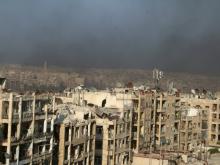
Despite intense bombing and severe food shortages, several Carmelite nuns are refusing to abandon the embattled Syrian city of Aleppo and have appealed for urgent aid.
“The bombs are falling all around us, but we are not going to leave the people in their suffering,” said Sister Anne-Francoise, a French nun from a community of Discalced Carmelites in Aleppo. “The people here are suffering and dying.”

A strike by U.S. jets nearly 60civilians on July 19 after mistaking them for ISIS fighters, reports The Telegraph.
Before being killed, eight families were fleeing their village of Tokhar in order to escape fighting between ISIS and the U.S.-backed rebels known as the Syria Democratic Forces, according to the reports.
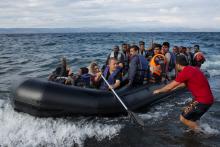
As of May 25, there had been 1,475 deaths since the beginning of the year. By May 30, that number climbed to 2,443 — 968 deaths in just 5 days.
Some officials are attributing this spike to smugglers taking risks with poorer boats as the weather gets nicer.

An airstrike in Aleppo, Syria, has killed at least fourteen patients and staff at a hospital supported by Doctors Without Borders. Among the dead is one of the last pediatricians in the city.
Neither the Syrian air force nor Russian military are currently taking responsibility for the attack. The United States and Russia agreed to support a truce between warring parties earlier this year, but those talks have largely broken down in recent months, according to The Washington Post.

A Roman Catholic bishop has challenged Austria’s plans to construct a fence to keep out refugees by refusing to allow the authorities to build on church land and arguing it runs contrary to the pope’s wishes. A fence “would contradict the spirit of the Gospel, Pope Francis’s clear message to Europe, and in particular for a diocese that was in the shadow of the Iron Curtain for decades,” Aegidius Zsifkokvics, the bishop of Eisenstadt, told the AFP news agency.
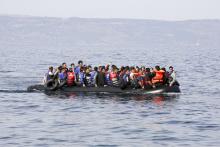
According to the United Nations’ refugee agency, up to 500 refugees may have drowned last week when an overcrowded ship sank, reports CNN. The 41 survivors of “one of the worst tragedies involving refugees and migrants in the last 12 months” are currently being housed at a stadium in Kalamata, Greece.
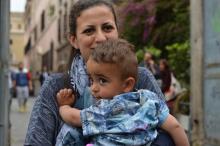
Three Syrian families flown to Rome by Pope Francis are calling their trip from the battle lines of a five-year civil war to safety in the shadow of the Vatican a “miracle” journey.
The heart of Rome’s Trastevere neighborhood, with its picturesque cobbled streets and vine-covered walls, could not be farther from the asylum-seeker camp the Muslim families were living in just three days ago.
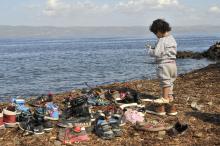
In accordance with a new deal between the E.U. and Turkey, Greece has begun deporting refugees to Turkey, reports Al-Jazeera. Meanwhile, according to a report issued by Amnesty International, the Turkish government has been forcing Syrian refugees back to Syria. If this is true, Turkey would be violating international law.
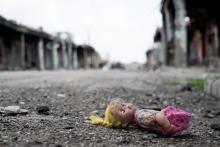
Chlorine gas has been used in Syria's civil war for years, but reports of chemical weapons used inside Iraq have been growing in recent weeks. Chlorine gas, mustard gas, and yellow phosphorous have all been discharged—sometimes against military targets, sometimes against civilians. In each case, the attacks leave telltale patterns of burns and physical damage.

Former Soviet dissident Natan Sharansky famously said that President Ronald Reagan’s 1983 “Evil Empire” speech was a turning point for him and other prisoners in the Soviet gulag.
“For us, that was the moment that really marked the end for them, and the beginning for us,” recalled Sharansky in a 2004 interview.
He and fellow prisoners communicated the news between cells with taps on walls and toilets. They understood immediately that the truth about the Soviet Union would resound around the world: Reagan’s moral condemnation made indifference toward Soviet oppression unthinkable.
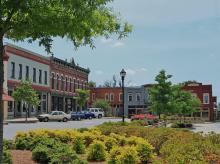
LAST FALL, MAYORS of 18 U.S. cities sent a letter to President Obama, promising to welcome Syrian refugees with open arms. Atop the list was Ed Pawlowski, the mayor of Allentown, Pennsylvania’s third largest city.
Pawlowski said his evangelical Christian faith—and America’s founding ideals—shaped his decision. “We like to say that America was built on Judeo-Christian principles,” he told Sojourners. “Then let’s follow our Judeo-Christian principles, which tell us to welcome the stranger because we were once strangers ourselves.” So far, about 10 Syrian refugee families have come to Allentown in the past year. More are expected.
There’s been some pushback from older Syrian immigrants in the community. Allentown is home to about 5,000 Syrians, many of them Christians who fled persecution in the past. Most of the new arrivals are Muslim.
Aziz Wehbey, head of the local American Amarian Syrian Charity Society, told CBS News he had concerns about the background checks on the new arrivals. “We need to know who we are welcoming in our society,” said Wehbey.
Another local Syrian charity, the Syrian Arab American Charity Association, has collected donations of food, furniture, and clothing for the refugees. So has St. George Antiochian Orthodox Church, where many Syrian immigrants worship.
Pawlowksi has spent a great deal of time talking to residents about their fears, such as concerns that the area will become “overrun” with refugees. He stressed that only a few families are coming to Allentown. They’ve lost everything, the mayor said, and need help: “We can handle this.”
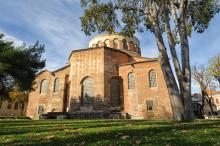
A religious summit last held more than 1,200 years ago suddenly risks being downgraded or postponed because of Syria’s four-year civil war. This unexpected twist has come as the world’s Orthodox churches, the second-largest ecclesial family in Christianity, were supposed to be only months away from their first major council since 787.
Now it is no longer clear when or where the Holy and Great Council of the Orthodox Church, a summit first proposed at least as far back as 1961 and provisionally scheduled for May in Istanbul, will be held.
With its traditional icons and complex liturgies, Orthodox Christianity can seem like an unchanging remnant of a long-lost era. But it lives very much in today’s world and its 14 autocephalous (independent) member churches can be wrapped up in its politics and subject to its pressures.
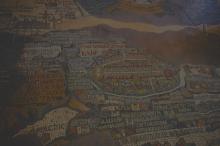
So what do we do about ISIS? The U.S. and the U.K. have decided that the answer is to bomb them. And it’s looking more and more like the answer will become to send troops.
But what do we do about ISIS? Does it make a difference whether I respond as an American or as a Christian? These days it’s hard to tell a distinction between the two. And that’s the question, and the answer, that scares me most.
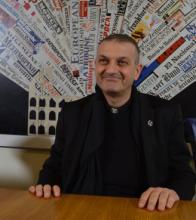
A Syrian priest held hostage for months by the ISIS terrorist group is certain his life was saved due to his interfaith work, despite being threatened with beheading by jihadists if he did not renounce Christianity.
The Rev. Jacques Mourad, a Syriac Catholic priest, was taken hostage in May from the Mar Moussa monastery, situated between the capital Damascus and the city of Homs. He and a volunteer from the monastery were forced into a car and driven for four days, during which time Mourad said he thought he would be killed.
“We could only perceive the sense of the desert. In that moment … I thought it was over,” he told members of Rome’s Foreign Press Association on Dec. 10, the first time he has spoken in detail about his odyssey since he escaped.

Speakers at the rally included representatives of the Islamic and Christian communities, the National Organization for Women, Code Pink, and Ghada Mukhdad, a Syrian refugee and member of the Syrian Civil Coalition which, according to their website, is a “lobby of Syrian civil society organizations, activists, and initiatives” that seeks to address “the increasing gap between the needs and priorities of the Syrian society on one hand and those making decisions concerning Syria.”
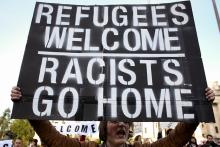
Johnson Ferry Baptist Church, a Southern Baptist megachurch north of Atlanta, has helped resettle a Syrian family, despite an order from Gov. Nathan Deal that the state would not accept Syrian refugees.
Bryant Wright, the church’s pastor and former president of the Southern Baptist Convention, told CNN Dec. 9 he understands the governor is “concerned about the security of the citizens of the state. But as Christians and as a church, we want to reach out with the love of Christ to these folks.”
He told The Atlanta Journal-Constitution that his church had been planning to help the family before the recent attacks in France.

I wonder if Pope Francis knows that he’s being used to justify bombing Syria.
After an all-day debate on Dec. 2, the House of Commons authorized the British government to begin bombing ISIS in Syria. Hours later, RAF Tornadoes attacked an oil field in eastern Syria.
During the debate, Caroline Spelman, the member of parliament who represents the Church of England in the Commons, noted that, “The Archbishop of Canterbury made it clear that, in his view, force might be necessary to keep the refugees safe.”
Then, citing Pope Francis, she said, “‘Where aggression is unjust, aggression is licit against the aggressor.’ These are views which I share, which is why I will support the motion.”

EVERY TIME I travel from Erbil, the capital of Iraqi Kurdistan, to Dohuk, Iraq, my drivers point to the same bridge. This, they say, is where ISIS was stopped by U.S. air power, just 15 miles from Erbil. It is a vital reminder that Kurdistan has twice been a safe haven: in the 1991 aftermath of the first Gulf War, to protect the Kurds from Saddam Hussein, and again last year when ISIS was at the city gates.
When I look on the Nineveh Plain just south of Kurdistan, it’s hard not to recall Cyrus the Great, who once conquered this entire part of the world. The book of Isaiah recounts God’s words to the mighty king, a nonbeliever, one who didn’t follow the God of Israel: “For the sake of Jacob my servant, of Israel my chosen, I summon you by name and bestow on you a title of honor, though you do not acknowledge me” (emphasis added).
The chaos and violence in this region continues to drive people from their homes. Currently, Kurdistan is the temporary “home” of 1.1 million people fleeing ISIS. Most are people of faith—Muslims, Christians, and Yazidis. The ripple effects spread out to refugee camps from Jordan to Germany.
Many U.S. Christians don’t think of God when it comes to geopolitics. We sometimes reduce Christ “the Lord of all” to Christ “our personal savior.” We might not be comfortable with the idea that if Christ is truly sovereign, then that includes our global politics.
As people of faith, we never give up hope, even in the violent situation in the Middle East, which promises to get worse before it gets better. Here are three steps you can take to address the ISIS crisis and its violent ripple effects:
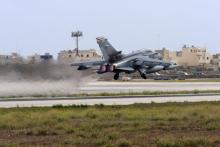
The British Parliament voted Dec. 2 to begin a bombing campaign in Syria in order to disrupt ISIS.
The vote took place after a contentious ten-hour debate in the House of Commons. Prime Minister David Cameron’s comments that those opposed to the bombing campaign are “terrorist sympathisers” hung in the background of the debate.